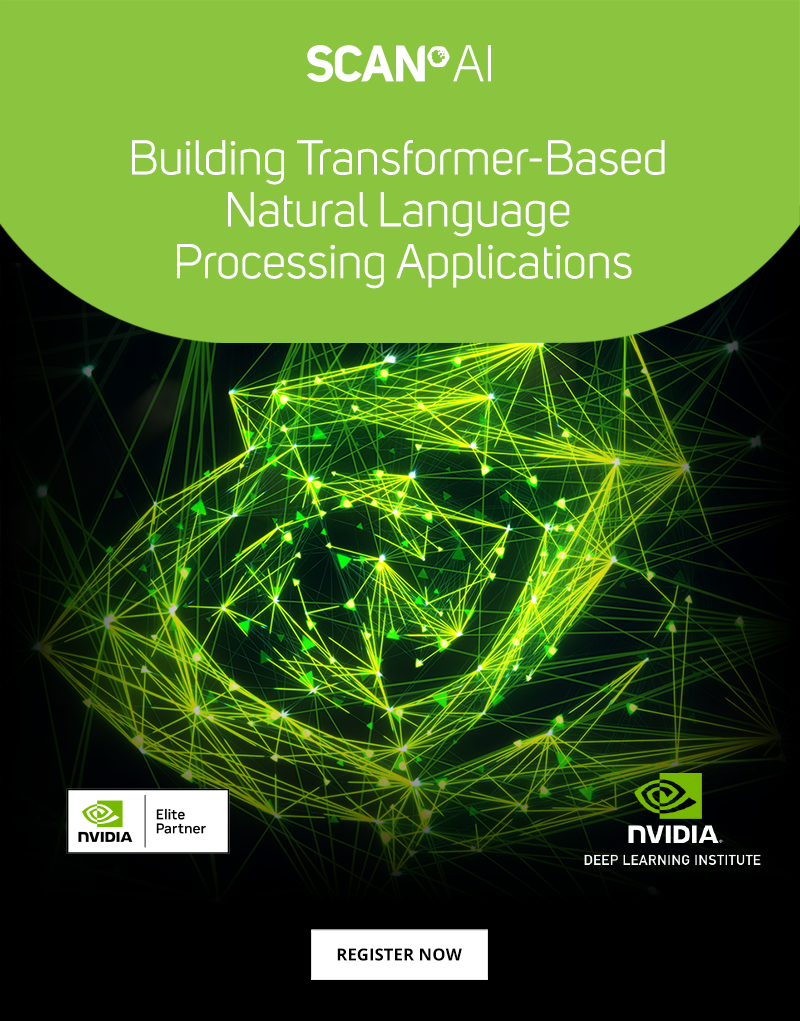Catch up on our recent newsletters
Here you will find an archive of our previous newsletters, bear in mind any offers or promotions may now be expired
View More Scanshots
The NVIDIA Deep Learning Institute (DLI) certifies Elite Partners such as Scan AI to deliver hands-on training in accelerated computing and data science. Developers, data scientists, researchers and students can get practical experience powered by GPUs in the cloud and earn a certificate of competency to support professional growth and organisational advantage.
Why should I attend this workshop?Applications for natural language processing (NLP) have exploded in the past decade. With the proliferation of AI assistants and organizations infusing their businesses with more interactive human-machine experiences, understanding how NLP techniques can be used to manipulate,
analyse, and generate text-based data is essential. Modern techniques can capture the nuance, context, and sophistication of language, just as humans do. And when designed correctly, developers can use these techniques to build powerful NLP applications that provide natural and seamless human-computer interactions within chatbots, AI voice agents, and more.
Deep learning models have gained widespread popularity for NLP because of their ability to accurately generalize over a range of contexts and languages. Transformer-based models, such as Bidirectional Encoder Representations from Transformers (BERT), have revolutionized NLP
by offering accuracy comparable to human baselines on benchmarks like SQuAD for question-answer, entity recognition, intent recognition, sentiment analysis, and more.
Transformer-based LLMs, such as Bidirectional Encoder Representations from Transformers (BERT), have revolutionized NLP by offering accuracy comparable to human baselines on benchmarks like SQuAD for question answering, entity recognition, intent recognition, sentiment analysis, and more.
In this workshop, you’ll learn how to use Transformer-based natural language processing models for text classification tasks, such as categorizing documents. You’ll also learn how to leverage Transformer-based models for named-entity recognition (NER) tasks and how to analyze various model features, constraints, and characteristics to determine which model
is best suited for a particular use case based on metrics, domain specificity, and
available resources.
By participating in this workshop, you’ll:
• Understand how text embeddings have rapidly evolved in NLP tasks such as Word2Vec, recurrent neural network (RNN)-based embeddings, and Transformers
• See how Transformer architecture features, especially self-attention, are used to create language models without RNNs
• Use self-supervision to improve the Transformer architecture in BERT, Megatron, and other variants for superior NLP results
• Leverage pre-trained, modern NLP models to solve multiple tasks such as text classification, NER, and question answering
• Manage inference challenges and deploy refined models for live applications
Desktop or laptop capable of running the latest version of Chrome or Firefox. Each participant will be provided with dedicated access to a fully configured, GPU-accelerated workstation in the cloud.
Assessment TypeSkills-based coding assessments evaluate students’ ability to build an NLP task, including a neural module pipeline and training.
Multiple choice questions evaluate students’ understanding of the NLP concepts presented in the class
Experience with Python coding and use of library functions and parameters
Fundamental understanding of a deep learning framework such as TensorFlow, PyTorch, or Keras
Basic understanding of neural networks
Suggested materials to satisfy prerequisites:
Python Tutorial,
Overview of Deep Learning Frameworks,
PyTorch Tutorial,
Deep Learning in a Nutshell,
Deep Learning Demystified
Join Scan for an ONLINE instructor-led workshop
05/10/2023
Introduction (15 mins)
Meet the instructor
Create an account at courses.nvidia.com/join
Introduction to Transformers (120 mins)
Explore how the Transformer architecture works in detail:
Build the Transformer architecture in PyTorch.
Calculate the self-attention matrix.
Translate English to German with a pre-trained transformer model
-Break (60 mins)-
Self-Supervision, BERT, and Beyond (120 mins)
Learn how to apply self-supervised Transformer-based models to concrete NLP tasks
using NVIDIA NeMo:
Build a text classification project to classify abstracts.
Build a NER project to identify disease names in text.
Improve project accuracy with domain-specific models.
-Break (15 mins)-
Inference and Deployment for NLP (120 mins)
Learn how to deploy an NLP project for live inference on NVIDIA Triton:
Prepare the model for deployment.
Optimize the model with NVIDIA® TensorRT™ .
Deploy the model and test it.
Final Review (15 mins)
Review key learnings and answer questions
Complete the assessment and earn a certificate
Take the workshop survey
Learn how to set up your own environment and discuss additional resources and training
Networking (30 mins)
Discuss your AI projects with the Scan AI data science team
Make a follow-up appointment
£62 ex VAT per person
REGISTER NOW
Call us on 01204 474210. Email us at [email protected]
Follow Scan Computers on:



